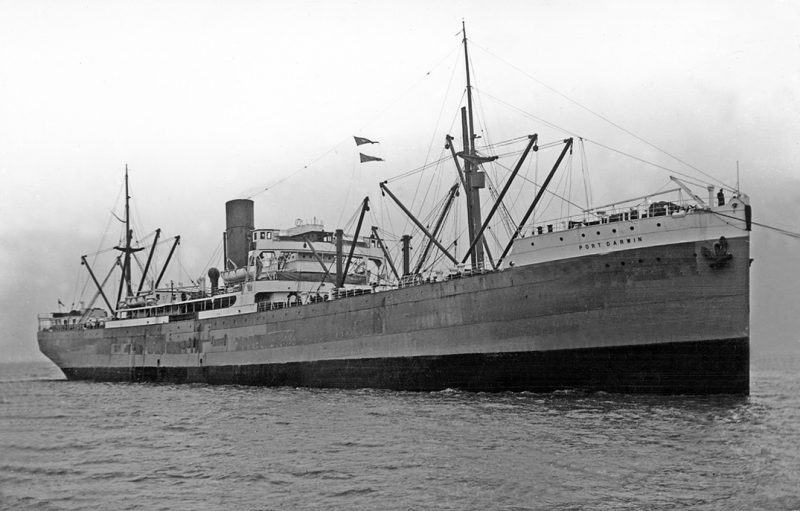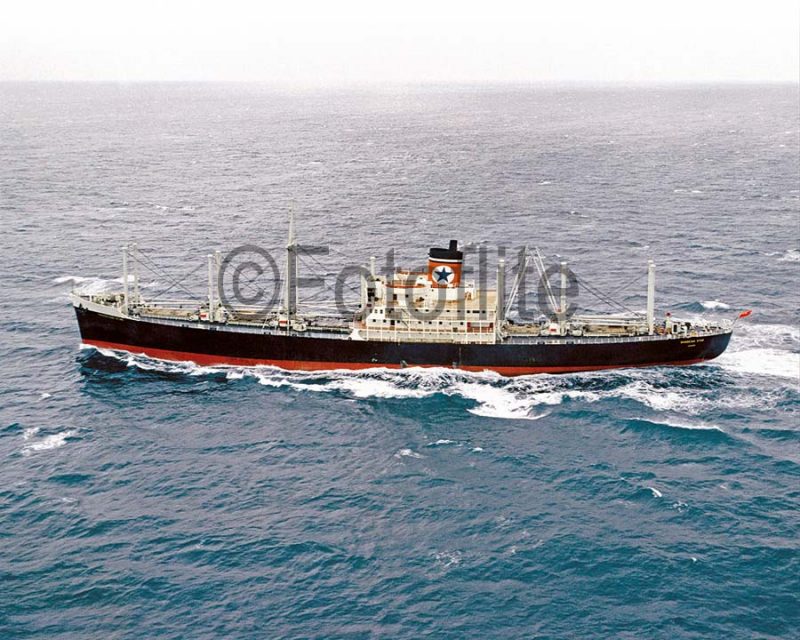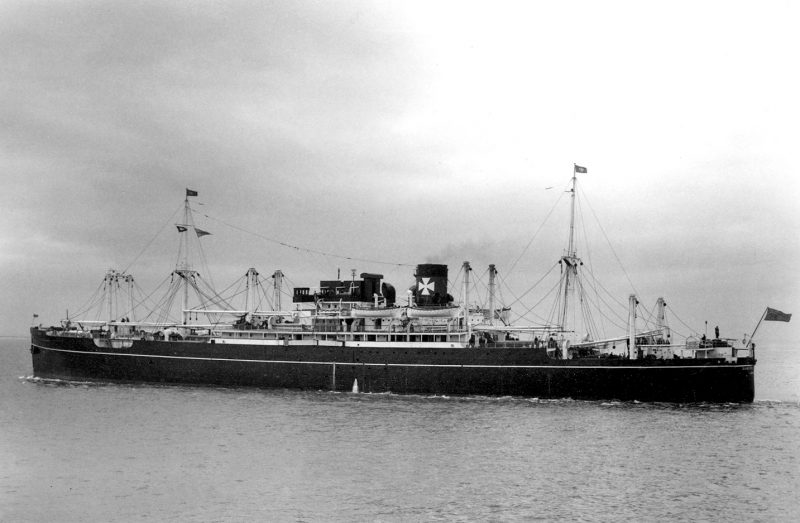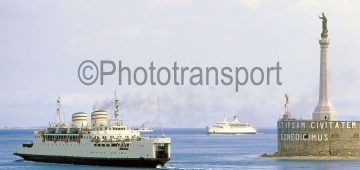Paid off ‘Under Protest’
By John Marking

In early April 1948 myself and shipmate Tony Ball, from West Wickham, completed our leave from the old coal burner Port Darwin and on 3rd April reported to the Merchant Navy Pool at Connaught Road, London Docks for our next jobs.
We were assigned to join the Rhodesia Star which was in the process of being converted in Mobile, Alabama, from an ex-WWII R.N. escort aircraft carrier to a merchant vessel, for the Blue Star Line of London.
We signed articles as E.D.Hs. (Efficient Deck Hands) on 5th April and two days later travelled with other joining crew members by boat train to Southampton docks and boarded R.M.S. Queen Elizabeth. It was at this stage we met Mr Crompton, the Rhodesia Star’s 2nd Officer, whose job it seemed was to shepherd us to our eventual destination.
At this time the Queen Elizabeth carried three classes of passengers, First Class, Cabin Class and Tourist Class, so imagine our surprise when Tony Ball and I ended up in a twin berth Cabin Class cabin. The ship sailed in the afternoon of 7th April for Cherbourg to pick up passengers joining from France. It was, I believe, her first call at that port in her post-war voyages to the U.S.A.
The trip across to New York was rather uneventful and although all the service and food on the ship was excellent, we had no spending money at all. Dollars were in short supply in Britain in those days if I recall correctly. Sir Stafford Cripps, the British Chancellor of the Exchequer, had seen to that. However I did meet Joe Louis, the champion American boxer, and his wife Marcia, who gave me their autographed photograph.
We arrived in New York on the evening of 12th April and after disembarkation formalities we were transported to (if my memory is accurate) the Pennsylvania station for an overnight rail trip to Mobile. By the time we boarded the train everyone was a bit whacked out so sleep came easily.
At daylight the next morning we were mustered by Mr. Crompton and told the maximum amount of dollars we could spend for a breakfast and the following lunch meals. It was not a great deal, but sufficient, although it was said later that the engine room crew ignored this advice.

Our arrival in Mobile was in the late afternoon and we were transported to the Bienville Hotel which seemed to be centrally located. The hotel had been quite up market in the 1920s when it had a big roof garden. However, by the time we arrived it had certainly seen better days and the garden on its roof had long disappeared. Nevertheless, the meals supplied by the Bienville were quite good. Once again, spending money was in short supply so we just passed the time seeing the sights of Mobile.
We had a few days to wait until work on the Rhodesia Star was completed and she then had run her trials off the Florida coast.
On joining the vessel in the shipyard we met Mr. Eric Hunsley-Smith the Chief Officer, who we later learned had been in the R.N. during the war and he seemed to find our merchant navy ways a little different. We also met Captain Charles H. Watson, the Master.
When boarding, one of my first impressions was noticing the all-metal fittings in the accommodation. This was apparently to comply with U.S. Coast Guard ship fire regulations, and the only major pieces of woodwork I can recall were the wheelhouse doors.

I cannot remember many other names of the ship’s complement apart from Mr. Danny Pethers, a Canadian A.B., and a big fellow who was the Chief Cook, an ex-WWII paratrooper with wound scars to prove it. Later, when we were at sea, the Chief Cook and Chief Steward did not seem to hit it off at all. We eventually left Mobile for Jucaro, in Cuba, to load sugar.
The ship anchored offshore and the sugar was brought out in barges to be loaded by ship’s gear. After the start of loading there were several working problems with the winches which the engineers seemed to have under control. Then, after a couple of days, about 2pm one day the whole ship suddenly went dead and all work came to an abrupt stop.
The ship had lost all oil pressure, and it was said the 3rd Engineer (a Dutchman on duty at the time) was found passed out on the engine room plates. Whether this was true or not I do not know, but remember as a result we were all ordered on deck armed with the ship’s emergency fire axes, chopping up wooden dunnage into strips no more than two inches wide to fit the engine room apertures. It was stinking hot in the afternoon sun, but after a few hours chopping they were able to get the oil pressure up again to working order.
We eventually left Jucaro for Cienfiegos, Cuba, but this time went alongside the wharf to load so we were able to get ashore for a spell.
Leaving Cienfuegos, the ship sailed for London, experiencing one or two breakdowns and in mid-Atlantic drifting for several hours, much to the consternation of the few (about 5) passengers onboard.
We arrived in London on 1st June 1948 and berthed at the Royal Albert Docks. Pay-off day was 2nd June and took place on board in the ship’s lounge.
A new system of leave had recently come into force whereby for every Sunday actually spent at sea an extra day would apply to our normally accumulated leave. During this voyage of Rhodesia Star we had only accumulated three or four Sundays at sea, but none of these extra leave days was included in our pay-off slips. This was brought to the attention of the Shipping Master who was on board for the pay-off. He agreed this extra leave should be included.

The Shipping Master mentioned this to Captain Watson who disagreed and said it should not be paid. The Shipping Master then asked Captain Watson to contact his owners, Blue Star Line’s London office where he later said it had been confirmed that the Sundays at Sea would not be paid.
The consequence of this was that the ship paid off ‘Under Protest’ which meant the Articles of Agreement could not be closed. I should add that while this little dispute was taking place two bowler-hatted ‘City’ gentlemen were inspecting the ship, one of whom we were told was Lord Vestey.
After leaving the Rhodesia Star my next job from the London Pool was Houlder Brothers’ Dunster Grange in which I made a round trip to Montevideo and the Argentine.
On my return to London from that voyage a letter from Blue Star was waiting, requesting me to call at their office to collect my Sundays at Sea leave money!

Rhodesia Star was certainly a ship to be remembered!



Comments
Sorry, comments are closed for this item